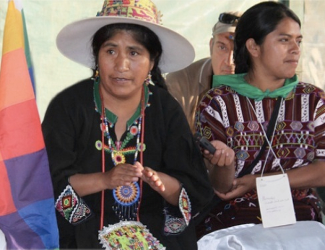Community knowledge to build just futures
Context
Today, many community knowledge systems are at risk.
Fast-paced economic, political, and cultural changes are bulldozing environments, practices and livelihoods. Various forms of knowledge are being erased from practice, commodified and colonized in the massive swallow of globalisation and in the promise of short-term gains or band aid solutions.
Definition
Buen Vivir, a concept adapted from Andean Indigenous peoples’ knowledges, is described as the collective achievement of a life in fulfillment, based on harmonic and balanced relations among human beings and all living beings, in reciprocity and complementarity. It means acknowledging that human beings are a part of nature, we depend on nature and are inter-dependent among ourselves.
Inherent in Buen Vivir is a vision that integrates production and reproduction as inseparable processes of the economy, of wealth production and living conditions.
Feminist perspective
In this sense, a broad understanding of Buen vivir from a feminist lens values relationships and resources mobilized in production and reproduction cycles—favouring equilibrium of not just the market kind—to guarantee continuity and changes as long as they are compatible with economic justice and life sustainability.
From a feminist perspective there have also been criticisms of the binary conceptions of gender and complementary of men and women. Binary conceptions leave little space for a deeper discussion on heteropatriarchy and non-conforming gender relationships.
Nevertheless, one of the main contributions of centralizing the principle of Buen Vivir to political, economic and social frameworks, is that equality is no longer the paradigm of individual rights, but the transformation of society as a whole.

Learn more about this proposition:
- Buen Vivir: An introduction from a women’s rights perpective in Boliva by Martha Lanza challenges the notion that Buen Vivir is gender neutral and calls for the dismantling of patriarchal power structures that persist. In the same publication, Magdalena León takes a look through a gender lens at how the cosmovision of Buen Vivir seeks to overcome ideals of permanent expansion and growth and sheds light on gender biases that need to be addressed.
- Buen Vivir: Today's tomorrow, by Eduardo Gudynas
- Indigenous Women's Visions of an Inclusive Feminism by Myrna Cunningham highlights the contributions from indigenous women in building a more diverse, inclusive and ultimately stronger feminist movement are key.
Part of our series of
Feminist Propositions for a Just Economy
